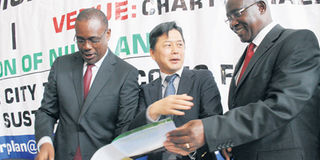Now EU to give both loans, grants

Nairobi Governor Evans Kidero (left), County Executive Tom Odongo (right) and JICA senior representative Koji Noda after announcing an integrated urban development masterplan for Nairobi this year. Nairobi has topped the list of the most strategic city for multinationals eyeing the African market. PHOEBE OKALL | NATION MEDIA GROUP
What you need to know:
- The delegation is set to fund construction of a new mass transport system for Nairobi to the tune of Sh15 billion.
- This is hoped to decongest the city by limiting the number of vehicles that get into the central business district. The transport system will cost about Sh89 billion ($1 billion) to implement.
The European Union will revise its mode of financing projects in Kenya from merely giving grants to dispensing loans, saying this is necessary to mobilise more finances for development.
The EU says it will partner with European development institutions.
“There is a bit of a shift in how we fund projects. We will no longer give just grants. We will partner with our European partners who give loans,” head of infrastructure at EU’s delegation to Kenya Dorian Kivumbi told Nation in an interview.
Institutions under consideration for the partnership include French Agency for Development (AFD), German Development Bank (KfW) and the European Investment Bank (EIB).
MASS TRANSPORT SYSTEM
Over the past 31 years, EU has granted Kenya Sh60 billion towards construction of various roads. The delegation is set to fund construction of a new mass transport system for Nairobi to the tune of Sh15 billion.
Of the amount, Sh7 billion will be in form of grants while the rest are loans from European institutions.
The new mass transport system, whose plan has already been adopted by the government, will see establishment of five major transport corridors around Nairobi on which lanes dedicated to mass public transport vehicles will be built.
This is hoped to decongest the city by limiting the number of vehicles that get into the central business district. The transport system will cost about Sh89 billion ($1 billion) to implement.
Apart from the EU, the project will be funded by the African Development Bank (AfDB), AFD, World Bank and Japan International Co-operation Agency.




